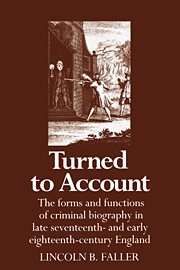 Turned to Account
Turned to Account Book contents
- Frontmatter
- Contents
- Preface
- Part I Turning criminals to account: three case histories and two myths of crime
- 1 The highwayman: power, grace, and money at command
- 2 Familiar murder: sin, death, damnation, repentance, God's grace, and salvation
- Part II Enucleating the truth: the criminal as sinner turned saint
- Part III Palliating his crimes: the thief as various rogues
- Postscript: Criminal biography and the novel
- Appendix I Who read the popular literature of crime?
- Appendix II The politics of thieving
- Notes
- Select bibliography
- Index
2 - Familiar murder: sin, death, damnation, repentance, God's grace, and salvation
Published online by Cambridge University Press: 05 February 2012
- Frontmatter
- Contents
- Preface
- Part I Turning criminals to account: three case histories and two myths of crime
- 1 The highwayman: power, grace, and money at command
- 2 Familiar murder: sin, death, damnation, repentance, God's grace, and salvation
- Part II Enucleating the truth: the criminal as sinner turned saint
- Part III Palliating his crimes: the thief as various rogues
- Postscript: Criminal biography and the novel
- Appendix I Who read the popular literature of crime?
- Appendix II The politics of thieving
- Notes
- Select bibliography
- Index
Summary
Home at night, and find that my wife had found out more of the boy's stealing 6s. out of W[illiam] Hewer's closet, and hid it in the house of office, at which my heart was troubled. To bed, and caused the boy's clothes to be brought up to my chamber. But after we were all a-bed, the wench (which lies in our chamber) called us to listen of a sudden, which put my wife into such a fright that she shook every joint of her, and a long time that I could not get her out of it. The noise was the boy, we did believe, got in a desperate mood out of his bed to do himself or William some mischief. But the wench went down and got a candle lighted, and finding the boy in bed, and locking the doors fast, with a candle burning all night, we slept well, but with a great deal of fear.
Samuel Pepys, Diary, 29 August 1660The horrid and unnatural crime of murder has, within a few years past, become more frequent than it was ever known to be; it has been committed by, and on those between whom there were the strictest ties of blood, and the nearest tie of kindred has not been any security against it. What a shudder must human nature receive, when it recollects there is no place where security may be depended on; for at the same time persons are barring their doors without, they are enclosing worse enemies within.
J.G., in a letter sent to Mary Edmondson in prison, printed in Joseph Clarke, A Refutation of the Narrative of the Trial of Mary Edmundson (1759), p. 9- Type
- Chapter
- Information
- Turned to AccountThe Forms and Functions of Criminal Biography in Late Seventeenth- and Early Eighteenth-Century England, pp. 21 - 42Publisher: Cambridge University PressPrint publication year: 1987
